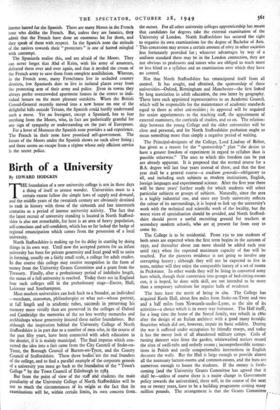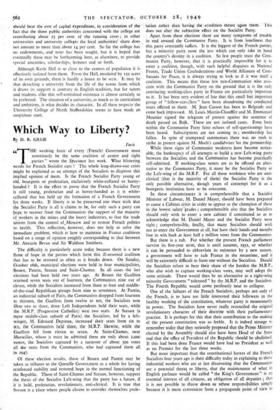Birth of a University
By EDWARD HODGKIN
THE foundation of a new university college is not in these days a thing of itself to arouse wonder. Universities must to a certain extent follow the simple laws of supply and demand, and the middle years of the twentieth century are obviously destined to rank in history with those of the sixteenth and late nineteenth centuries as a period of intense university activity. The fact that the latest recruit of university standing is located in North Stafford- shire is also not remarkable, for here is an area of heavy population, self-conscious and self-confident, which has so far lacked the badge of regional emancipation which comes from the possession of a local university.
North Staffordshire is making up for its delay in starting by doing things in its own way. Until now the accepted pattern for an infant university has been for private generosity and local good will to unite in forming, usually on a fairly small scale, a college for adult studies. In due course this college may receive recognition in the form of money from the University Grants Committee and a grant from the Treasury. Finally, after a probationary period of indefinite length, the status of a full university is reached. Today there are in England four such colleges still in the probationary stage—Exeter, Hull, Leicester and Southampton.
Most modern universities can look back to a Founder, an individual —merchant, statesman, philanthropist or what not—whose portrait, at full length and in academic robes, succeeds in preserving his memory more vividly than are preserved in the colleges of Oxford and Cambridge the memories of the no less worthy monarchs and archbishops whose generosity insured these earlier foundations. But although the inspiration behind the University College of North Staffordshire is in part due to a number of men who, in the course of the past fifty years, have been connected with adult education in the district, if it is mainly municipal. The final impetus which con- verted the idea into a fact came from the City Council of Stoke-on- Trent, the Borough Council of Burton-on-Trent, and the County Council of Staffordshire. These three bodies are the real founders of the college, and to find a parallel example of the corporate genesis of a university you must go back to the foundation of the " Town's College " by the Town Council of Edinburgh in 1583.
But from the point of view of the staff and students the main peculiarity of the University College of North Staffordshire will be not so much the circumstances of its origin as the fact that its examinations will be, within certain limits, its own concern from..
the outset. For all other university colleges apprenticeship has meant that candidates for degrees take the external examination of the University of London. North Staffordshire has secured the right to organise its own examinations for the degree of Bachelor of Arts. This concession may arouse a certain amount of envy in other societies less fortunately provided for ; whatever advantages by way of a uniform standard there may be in the London connection, they are not obvious to professors and tutors who are obliged to teach more or less blind to a syllabus and an examination over which they have no control.
Not that North Staffordshire has emancipated itself from all control. It has sought, and obtained, the sponsorship of three universities—Oxford, Birmingham and Manchester—the first linked by long association in adult education, the two latter by geography. These have each appointed representatives to an Academic Council, which will be responsible for the maintenance of academic standards equal to those at other uniiersities ; its approval will be required for senior appointments to the teaching staff, the appointment of external examiners, the curricula of studies, and so on. The relation- ship between the young College and the older universities will be close and personal, and for North Staffordshire probation ought to mean something more than simply a negative period of waiting.
The Principal-designate of the College, Lord Lindsay of Birker, has given as a reason for the " sponsorship " plan " the desire to have a greater freedom of experiment in regard to syllabus than is possible otherwise." The uses to which this freedom can be put are already apparent. It is proposed that the normal course for a B.A. degree will last four years instead of three, and that the first year shall be a general course—a szudium generale—obligatory to all, and including such subjects as modern institutions, English, foreign languages and experimental science. After the first year there will be three years' further study for which students will select particular subjects or groups of subjects. Naturally, since the area is a highly industrial one, and since any lively university reflects the colour of its surroundings, it is hoped to link up the university's work with the technical and scientific work of the locality, but the worst vices of specialisation should be avoided, and North Stafford- shire should prove a useful recruiting ground for teachers at secondary modern schools, who arc at present far from easy to come by.
The College is to be residential. From 150 to 200 students of both sexes arc expected when the first term begins in the autumn of 1950, and thereafter about 200 more should be added each year until 1953 when the expected maximum capacity of 80o will be reached. For the pioneers residence is not going to involve any corrupting luxury ; although they will not be expected to live in tents, neither will they enjoy the comparable luxury of a set of rooms in Peckwatcr. In other words they will be living in converted army huts which, though their conversion into groups of bed-sitting-rooms can, it is hoped, be done with skill, arc not intended to be more than a temporary substitute for regular halls of residence.
The huts have the merit of being in situ. The College has acquired Kccle Hall, about five miles from Stoke-on-Trent and two and a half miles from Newcastle-under-Lyme, as the site of its activities—a choice which is in every way fortunate. The Hall itself, for a long time the home of the Sneyd family, was rebuilt in 1860 after the design of an Italian architect with a good many heraldic flourishes which did not, however, impair its basic solidity. During the war it suffered under occupation by friendly troops, and today it has the messy look of all abandoned military camps. Coils of rusting dannert wire litter the garden, whitewashed notices record the sites of swill-tubs and orderly rooms ; incomprehensible instruc- tions in Polish and easily comprehensible instructions in English decorate the walls. But the Hall is large enough to provide almost all the necessary lecture-rooms and common-rooms, and the huts are numerous enough to house the students. If the money is forth- coming (and the University Grants Committee has agreed that it shall be—unless of course there is a major change in Government policy towards the universities), there will, in the course of the next ten or twenty years, have to be a building programme costing many million pounds. The arrangement is that the Grants Committee
should. bear the cost of capital expenditure, in consideration of the fact that the three public authorities concerned with the college are contributing about 25 per cent. of the running costs ; in other universities and university colleges the local authorities' share does not amount to more than about 14 per cent. So far the college has no endowments,. and none has been sought, but it is hoped that eventually these may be forthcoming here, as elsewhere, to provide special amenities, scholarships, lectures and so forth.
Although Keele Hall is so close to the centres of population it is effectively isolated from them. From the Hall, insulated by 15o acres of its own grounds, there is hardly a house to be seen. It may be that detaching a university from the life of the towns from which it draws irs support is contrary lo English tradition, but for tutors and students alike this self-contained existence is almost certainly to be preferred. The situation of a university, as much as its curriculum and ambitions, is what decides its character. In all these respects the University College of North Staffordshire seems to have made an auspicious start.







































 Previous page
Previous page